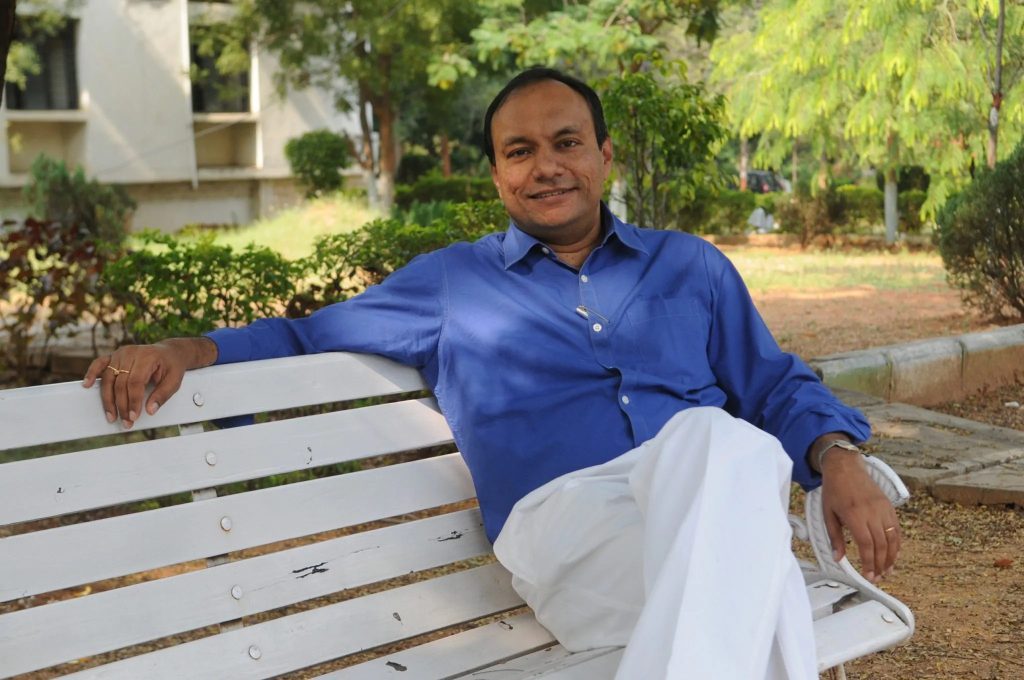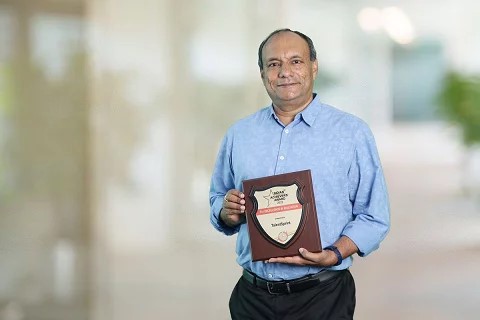(December 2, 2023) In 2007, Dr Santanu Paul did what few IIT-ians in the US chose to do. He returned to India. In Hyderabad, in the epicentre of the Indian tech boom, Dr Paul realised that the industry was struggling to hire talent with relevant skills, despite the thousands of engineers and techies being churned out by the higher education ecosystem every year. It sparked the idea for TalentSprint, now a global platform for deeptech and high-end coding bootcamps, with over 3,50,000 learners to date. TalentSprint caters to a wide spectrum of people, from young graduates to seasoned professionals, bringing them up to date on disruptors like AI, machine learning, spacetech and digitial health. WISE, their program aimed at reducing the gender gap in tech, received funding from Google in 2019.
A storied career
After finishing school at Ramkrishna Mission in Narendrapur near Kolkata, Paul, always a bright student, joined IIT-Madras for a degree in engineering. Armed with a BTech in Computer Science, he moved to the US for postgraduate studies in 1990 and received a PhD in Computer Science & Engineering in 1995 from the University of Michigan. This started his professional journey as a research scientist at the IBM T.J. Watson Research Center in New York from 1995-1999. “I was soon bitten by the entrepreneurial bug and I co-founded a co-founded a B2B tech company, Viveca Inc., where I was the CTO for two years. In 2000, Viveca was acquired by OpenPages and I continued as CTO till early 2003. Both were Boston-based tech firms, with investments from Matrix Partners and Sigma Partners, both blue chip East Coast venture capital firms,” Dr Paul tells Global Indian.

Dr Santanu Paul, founder, TalentSprint, is on a mission to revolutionise deep tech education in India
Creating industry-ready talent
Later that year, Dr Paul decided to relocate to Hyderabad with his family, and he took on the role of Senior Vice President and Head of Global Delivery Operations for Virtusa Corporation until 2008. By 2007, Virtusa had listed on NASDAQ and he played an instrumental role in building Virtusa India into a 4000+ strong organization. Post his corporate life in Virtusa, he returned once again to entrepreneurship and co-founded TalentSprint, an edtech firm with a difference. “We began our journey at the end of 2009 with an idea to help 90% of India’s STEM (Science, Technology, Engineering, and Mathematics) graduates who receive degrees but are ill-equipped to pursue careers in software engineering because of inherent weaknesses in our higher education ecosystem,” he says.
These flaws meant the booming industry struggled to hire young talent with relevant skills. The conversion rate from interviews to actual hires was quite low, often just 2-3%. To address this problem, he created coding bootcamps as their core offering. These bootcamps equipped fresh STEM graduates with the hard and soft skills they needed to start their careers with great confidence. “Then we noticed there was a huge gap between the demand and supply for deep tech talent, so we went on to introduce deep-tech programs for experienced tech professionals as well,” Dr Paul explains. This was done in close partnership with some of India’s top institutions, including the IIMs, IITs and IIITs. These initiatives became the cornerstones of TalentSprint’s success.
The edtech revolution
Around a decade ago, Dr Paul realised that even seasoned industry professionals aren’t immune to disruption – AI, machine learning, data science and space tech were creating a new genre of demand for talent. TalentSprint followed with deep tech education for executives. TalentSprint has made significant contributions to the ed-tech sector by focusing on developing deep tech talent, offering courses in AI, machine learning, data science, semiconductors, space tech and digital health, among others. The programmes were designed to be specialised and futuristic, “providing learners with in-depth knowledge, hands-on experience, and practical skills in deep tech domains, offered in collaboration with top academic institutions, global corporations, and industry experts to ensure their relevance and effectiveness,” says Dr Paul. By nurturing deep tech talent, they play a vital role in bridging the skill gap and meeting the industry’s demand for skilled professionals and contributing to the overall development of the technology ecosystem.

Naturally, his journey at TalentSprint has been phenomenal. The team offers innovative learning programs and transformational bootcamps to new-age professionals who want to build deep expertise to future-proof themselves. Global big-tech businesses such as Google, PegaSystems, and elite academic institutions like IISc, IITs, IIMs, IIIT Hyderabad, Carnegie Mellon University, University of Michigan have partnered with them in this current journey. World-class academic rigor and industry-leading practitioner expertise are seamlessly blended in the programs we offer. With TalentSprint’s patent-pending AI-powered learning platform, the team has reached over 350,000 learners. “Our programs have a 95% completion rate, coupled with an outstanding Net Promoter Score of 85 — a benchmark that stands among the highest in the ever-evolving landscape of educational technology,” Dr Paul remarks.
Bridging the gender gap
The company has also been working on addressing gender disparity in the tech industry as a focal point. Even in 2023, women remain drastically underrepresented in the tech sector, with their share among tech professionals being only 29 percent. Although they have been breaking traditional barriers in recent years, women make up only 8 percent of leadership roles in tech industries. They also tend to earn around 17% less than their male counterparts. TalentSprint flagged off the Women in Software Engineering (WISE) program in 2012, their attempt to make strides towards gender inclusivity.
The breakthrough moment occurred when they presented data from their WISE program to Google in the US. Google offered them funding in 2019, giving rise to their pioneering Women Engineers program (WE), now in its fifth edition. WE offers scholarships and full tuition coverage for two years and has impacted the lives of over a thousand female students from tier 2/3/4 locations. “The WE programme is aimed at cultivating a self-reliant ecosystem of technically adept and confident women professionals,” Dr Paul explains. Continuing with the spirit of giving back, their C-STEM (Computational Science, Technology, Engineering, and Mathematics) Programme is designed for middle-school students, particularly those from underprivileged backgrounds, aiming to bridge the access gap to STEM education.
Racial diversity in the US
Inspired by this feat, TalentSprint and Google extended the model to address racial diversity in the US. Their TechWise programme, now in its second cohort, “is dedicated to empowering minority students that are historically underrepresented in the Silicon Valley narrative,” says Dr Paul.
The company is also strategically broadening its collaborations with top-tier universities in the United States. “We take a responsible approach to financial performance, which has allowed us to scale,” Dr Paul says. The company is also venturing into new areas like management, leadership and K-12 segments, alongside an emphasis on expanding our their B2B offerings. “Innovation is in our DNA,” he smiles. That’s evident in their development of iPearl.ai, an AI-powered learning management system. “We want to launch hyper-niche, industry relevant programs through innovative business models catering to diverse audience segments,” he says.
Advice to aspiring entrepreneurs
For aspiring entrepreneurs, his advice echoes the wisdom of visionaries like Steve Jobs. Success in entrepreneurship stems from a long-term perspective and striving to make a difference with all sincerity means that outcomes are likely to follow. “We must embrace adversity as our greatest teacher on the road to accomplishment. My foremost counsel is to pick substantial, challenging problems to solve. We must resist the allure of quick gains and instead focus on addressing pivotal issues and build enterprises around solving intricate problems through impactful and elegant solutions. This approach does not just promise financial success, it also brings inner fulfilment and garners respect on a global scale,” says Paul.
- Follow Dr Santanu Paul on LinkedIn




